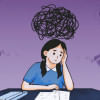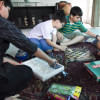Play should be a fundamental right for all children

Children's busy lives of school, tutoring, homework, and chores leave little time for anything else—including active movement and play. Yet play is vital to children's physical, mental, and social wellbeing. Play is not a unique human construction: baby animals engage in play, using it to learn a variety of important skills.
When children play—preferably at least some of the time outdoors and among others—they get necessary exercise, gain coordination, learn how to cooperate and socialise with others, and gain relief from stress. Play builds resilience, instils confidence, teaches creativity, and is vital for children's full development.
Many years ago, I encouraged my winter interns from the Asian University of Women to organise a parklet near our office. A parklet involves temporarily or permanently converting one or more car parking spaces into a space for play.
When my interns returned, flush with excitement, I listened to their stories about the euphoria of the local children on being invited to come out of their homes and into the street to play. But what I particularly remember is the story of one girl who finally made it downstairs just as my interns were packing up. They offered her a hula hoop, which she cheerfully used.
"Did you have fun?" they asked her when she paused to rest.
"Yeah!" she exclaimed.
"Where do you usually play?" they then asked.
"Play?" she looked at them blankly. "I don't play."
Upon hearing their story, I was shocked. I joke with my staff about having climbed mango trees and raced around rice paddy as a child; in fact, I played house in the mountains and converted rocks into dolls. My best friend and I would play as monkeys in the front yard, running to hide every time a lion (car) passed on the street "trying to kill us." (We were right on point there.)
Play was a vital part of childhood; I couldn't imagine not being given the opportunity. Nor did all the time I spent playing take away from my achievements. On the contrary, I would argue that the active play and the imagination and creativity that play stimulated helped contribute to my academic and professional success.
It is tragic that so many parents and guardians are unaware of the vital nature of play in children's lives, believing it is a frivolous activity, a waste of time, or even a dangerous activity that puts children in contact with potentially harmful objects and people. In the effort to protect our children and prepare them for a demanding educational and future professional environment, too often we harm those we most cherish.
" layout="left"]In order to bring attention to the importance of play, an international coalition of organisations including BRAC has come together to successfully convince the United Nations to make June 11 the International Day of Play.
As the organisers of the International Day of Play point out, play is (or should be) a fundamental right for all children. And yet too many children can't play because they lack the time or the opportunity, busy helping their families, studying, or unable to go outdoors due to horrific traffic.
Children need to play, and to ensure that they can, we need policies, training, and funding so that play can become integrated into our educational institutions and communities. Those policies must ensure that all children have the ability to play, including those with disabilities, refugees, and other vulnerable children.
While virtually all children understand that play is important, one in three children in the world do not get to play. Children involved in the International Day of Play are calling on decision-makers and other adults to provide children with time and opportunity to play in diverse and inclusive ways, including in school, to listen to children's needs, and to support children in developing needed social and other skills through play.
Understanding the vital nature of play, and seeing how neglected it is at least in the cities of Bangladesh, I can only encourage my readers to learn more about the issue and join in the #InternationalDayofPlay. Our children will be healthier, happier, more resilient, more confident, and more able to take on the many challenges they will face in life. What's not to like?
Debra Efroymson is executive director of the Institute of Wellbeing, Bangladesh.
Views expressed in this article are the author's own.
Follow The Daily Star Opinion on Facebook for the latest opinions, commentaries and analyses by experts and professionals. To contribute your article or letter to The Daily Star Opinion, see our guidelines for submission.

 For all latest news, follow The Daily Star's Google News channel.
For all latest news, follow The Daily Star's Google News channel. 










Comments